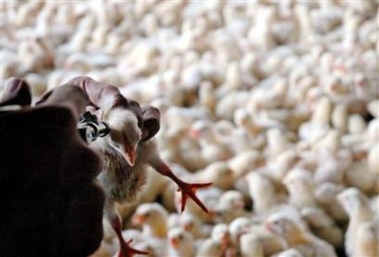|
WHO cautious over Indonesia bird flu outbreak
(AP)
Updated: 2005-09-22 18:52
The growing number of people with bird flu-like symptoms in Indonesia does not mean the outbreak is becoming worse, and there is no sign the virus can be passed easily among people, top U.N. health experts said on Thursday.

An Indonesian worker vaccinates a chick on a farm to protect thousands of healthy chickens from bird flu virus in Banten town of West Java province September 22, 2005. [Reuters]
Alarm has spread in populous Indonesia. Bird flu has killed four people and 11 are under observation in the capital. Two others, both children, have also died but the government is awaiting results to confirm if the H5N1 virus killed them.
Despite the cases, there is no evidence the H5N1 strain has mutated into a form that could trigger a pandemic, said Georg Petersen, the World Health Organization's Indonesia representative.
Nevertheless, he pointed to the possibility of transmission through very close contact with an infected person.
"I think very close contact with a sick person might infect that caretaker. That is why in hospitals we need to take all precautions ... That would be in a way a human-to-human transmission, but that demands close, close contact," he said.
Petersen said the case of a father and his two daughters who died in the Tangerang suburb of Jakarta in July might have involved "within-family transmission."
Thailand had reported a probable case of human-to-human transmission in September 2004, when a 26-year-old woman died of bird flu after "prolonged face-to-face exposure" with her daughter, who was hospitalized with the virus.
Dr Margaret Chan, the WHO's global special representative on avian flu, also said on Thursday there was no sign the virus had mutated into a form that could easily spread among people.
"So far there is no evidence for increased chance of human-to-human transmission," Chan told Reuters by telephone from Sydney after attending a WHO conference in Noumea, capital of New Caledonia in the South Pacific.
All the confirmed and suspected cases have come from, or near, the capital Jakarta.
Chan said the rise in the number of suspected cases did not point to an epidemic.
"With increased surveillance it's not unusual that you would pick up more cases," Chan said.
Bird flu has killed 64 people in Asia since 2003 and has since been found in birds in Russia and Europe.
HIGH ALERT
Petersen said laboratory tests on people killed by bird flu in Indonesia showed they had the same or a similar virus that has killed millions of poultry in Asia.
"The tests from the 37-year-old woman ... so far that looks like the bird virus. So there is no reason to believe there has been any mutation so far," Petersen said of the fourth confirmed bird flu death in the country.
Indonesia's health minister said on Thursday a two-year-old girl who died in Jakarta this week had shown bird flu symptoms, adding that hospitals would be enhanced to cope with the virus.
Eleven patients were now under observation at the designated bird flu hospital in Jakarta, Siti Fadillah Supari added, raising the number from 10.
Indonesia is waiting results from Hong Kong after a five-year-old girl also died on Wednesday after suffering bird flu-like symptoms.
I Nyoman Kandun, the head of disease control at Indonesia's health ministry, said tests so far showed only one patient out of those under observation was positive for the H5N1 virus. That patient was related to the Jakarta woman who died of bird flu almost two weeks ago.
The government has appealed for public calm over the outbreak, which has dominated local media in recent days. On Monday, it imposed a state of high alert, giving authorities power to order people with symptoms of the virus into hospitals.
The WHO last week warned bird flu was moving toward a form that could be passed between humans and the world had no time to waste to prevent a pandemic. Past pandemics have killed millions.
The U.N. health agency was also working with Jakarta to bolster stocks of the anti-viral drug Tamiflu.
Australia said on Thursday it would pay A$30,000 for 10,000 doses of anti-viral bird flu medicine for Indonesia aimed at protecting health workers in the event of a pandemic.
|